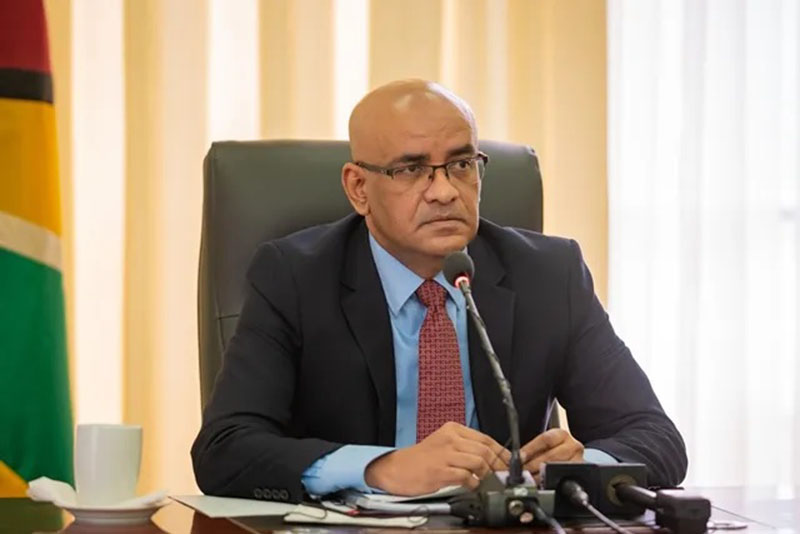Reiterating his disappointment that the Conference of Parties (COP) 28 held in Dubai, United Arab Emirates failed to address critical matters such as climate financing and forest incentives, Vice President Bharrat Jagdeo said that the government will ensure that these issues are addressed at the “national level”.
During a press conference held at Freedom House, Robb Street on Thursday, Jagdeo in his capacity as General Secretary of the People’s Progressive Party, referenced Article Six of the Paris Agreement, which deals with a compliant carbon market. According to Jagdeo, this matter failed to gain traction at the summit and poses a setback that prevents countries from benefiting financially from preserving their forests. Asked by this newspaper about the rationale of attending the summit which produced the same results in the past, Jagdeo said it required full participation from countries. He noted that the government will do its part to implement a framework that aims at paving the way for incentives for adaptation and climate financing.
“We saw a lot of pledges at the summit which were good, but they are not grounded nor anchored in the core United Nations Framework Convention on Climate Change agreement and so that is why they are not going to be measured as significant,” Jagdeo posited. Guyana’s contribution to COP28, in this area, focused on championing the cause for the establishment of market-based mechanisms to promote forest conservation, premised on the Low Carbon Development Strategy 2030. “It’s an age-old fight, we started in 2007 to push for this market-based mechanism. We did not succeed because the global north was unprepared to put up the money,” Jagdeo explained. According to him, this will impact developing forested nations that are providing a service to the global community in the fight against climate change and its effects.
Jagdeo said Guyana will not be adversely impacted as it has embarked on a pathway that will see the country earning US$750 million in ten years through the sale of its carbon credit to Hess Corporation in the voluntary carbon market. Of this, 15 percent (US$112 million) will be injected towards advancing Amerindian development, while the balance will be used for adaptation and climate resilience infrastructure. “Unfortunately, a lot of countries that have good policies surrounding the forests, they’re not going to get that financing at the magnitude like we got because we struck out on our own,” he informed media operatives.
Although the need for smaller countries to implement climate adaptation mechanisms has been recognised, a pledge from developed countries to provide long-term predictable financing at scale for these nations did not materialise. “They recognize that the countries don’t have the capability, the financial capacity to do it and yet they’re unprepared to assist them to do it, the developed countries … so, we leave COP28 without any long-term predictable financing at scale for adaptation for these countries and it’s a pity,” he highlighted. Jagdeo said this is a major loss for countries that are financially constrained when it comes to climate adaptation and have no assets such as the forest, to provide additional revenue streams.
Meanwhile, COP28 saw the advancement of the Loss and Damage Climate Fund, where nations promised to aid developing countries in coping with climate-related harms. However, the funds pledged so far appear to be a mere drop in the bucket. Coupled with that, the mechanism through which the funds will be disbursed, Jagdeo said, is somewhat bureaucratic. “You would see that this is a paltry sum … it will be significant while it gets to the hands of these countries but it’s a tiny sum. Just think about $400-odd million for the entire world for loss and damage,” he added.
COP28 also saw countries agreeing to transition from fossil fuels, which the General Secretary believes is unrealistic due to the absence of financial resources to transition to renewables. He said that this was just wishful thinking unless backed by investment and a major reduction in the demand for fossil fuels. “…Countries are going to operate based on what’s in their best interest … and by phasing out fossil fuel, it will drive up costs significantly,” Jagdeo said. Climate financing is needed for mitigation, he said, because large-scale investments are required to significantly reduce emissions. According to him, this mechanism is equally important for adaptation, as significant financial resources are needed to adapt to the adverse effects and reduce the impacts of a changing climate.
The Paris Agreement reaffirmed the obligations of developed countries, while for the first time encouraging voluntary contributions by other parties. Through this mechanism, a company in one country can reduce emissions in that country and have those reductions credited so that it can sell them to another company in another country. The agreement recommended that parties should also continue to take the lead in mobilising climate finance from a wide variety of sources, instruments, and channels, noting the significant role of public funds, through a variety of actions, including supporting country-driven strategies and taking into account the needs and priorities of developing countries. That second company may use them to comply with its emission reduction obligations or to help it meet net zero.
Against this background, Jagdeo believes it is important for all governments and stakeholders to understand and assess the financial needs of developing countries, as well as understand how these financial resources can be mobilised. He noted that the provision of resources should also aim to achieve a balance between adaptation and mitigation. With all this being said, the Vice President said that the government will not give up on its position concerning the dire need to implement provisionary measures that will address adaptation, climate financing and forest incentives. Jagdeo told Stabroek News that while COP has its mandate for international interests, the government has to put the country first.






